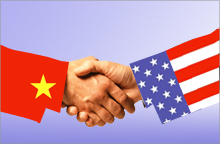|
Vietnam: The trade fight U.S. companies are keen to tap into Vietnam's fast-growing economy and consumer market. So what's the hold up? NEW YORK (CNNMoney.com) -- Call it the Vietnam clothes conflict. The Bush administration, worried that American business is losing out on a growing overseas market, is on the verge of making Vietnam a full-fledged trading partner.
But clothing and fabric makers are fighting the move. The way they see it, the U.S. would be giving up major money in domestic business - their business - in order to win relatively meager returns and doubtful entrance to markets overseas. "Vietnam could easily become the second-largest single-country apparel supplier to the U.S.," said Lloyd Wood, spokesman for the American Manufacturing Trade Action Coalition (AMTAC). "At the same time, Vietnam doesn't have the potential to buy at the same level from the U.S. You have to question this dynamic when the United States is facing an $800 billion trade deficit." Vietnam rang up $6.5 billion in U.S. exports in 2005. Total U.S. exports totaled $1.2 billion. Last year the U.S. imported more than $3 billion of apparel from Vietnam, up sharply from a mere $49 million imported just five years ago, according to the Commerce Department. Currently Vietnam's textile imports to the U.S. are restricted. But legislation is moving through Congress to award Permanent Normal Trade Relation status - formerly known as "most favored nation" status - to Vietnam. That means Vietnam would get the same general tariff treatment the United States extends to other members of the World Trade Organization in return for mutually favorable tariff treatment for U.S. exports. "To reap the commercial benefits of Vietnam's commitments, we need to extend permanent normal trade relations," said Senate Finance Committee chairman Sen. Chuck Grassley (Rep. Iowa). In turn, the senator noted, that would let U.S. companies realize lower duties on agricultural exports like pork and dairy products and on U.S. manufactured goods. Plus, it would open the Vietnamese services sector to banking, insurance, telecommunications and other opportunities for American corporations. But it would also open the door for "dumping" of cheap apparel imports into the United States, opponents argue. That could hurt jobs. And so legislators from textile states, specifically Sen. Elizabeth Dole (Rep. N.C.) and Sen. Lindsey Graham (Rep. S.C.), are holding up the legislation. Sen. Dole (Rep. N.C.), noted in a statement her state's textile industry has been hit hard in recent years largely because of textile imports. She wants a series of trade remedies to be put in place, such as expanding anti-dumping and countervailing duty laws, and extending quota limits on Vietnamese textiles. The holdup, which could conceivably stretch through the fall, could be a problem for the Bush administration. Trade experts said the legislative timetable was drafted keeping in mind that Vietnam is expected to join the WTO in October and Bush's visit to Hanoi in November for the Asia Pacific Economic Cooperation (APEC) leaders' meeting. As a WTO member, Vietnam won't be limited by any apparel export quotas. But U.S. businesses will not be able to take advantage of the same trade benefits and market access opportunities that other WTO members will get, according to Neo Tran, program manager with the U.S -Vietnam Trade Council. "The U.S. negotiated very hard with Vietnam on concessions as part of supporting Vietnam's WTO effort. Vietnam won't grant U.S. these benefits without the PNTR," Tran said. Citigroup (Charts) is worried. Citigroup spokesman Lionel Johnson said the company is keen to grow its business in Vietnam. It already has two corporate banking branches in in the country and is hoping to grow its consumer franchise there. Vietnam, a communist nation of 84 million people, is the fastest growing major economy in Southeast Asia. It had a growth rate of 8.4 percent in 2005. Its gross domestic product (GDP) has grown from $31 billion to $50 billion over the past four years. Its new prime minister, Nguyen Tan Dung, 56, is reputed to be pushing for a more market-oriented economy. A 2005 study from consulting firm A.T. Kearney rated Vietnam as a more attractive market than China for retailers eyeing overseas expansion. Consumer spending in Vietnam rose 16 percent last year and retail sales increased 20 percent in 2005 versus the previous year. Said Johnson, "The current bilateral framework doesn't allow us to engage in consumer activity. Without the PNTR status, U.S. companies will be at a disadvantage from day one." Similarly, insurance provider ACE Group is hoping for a trade breakthrough. "Vietnam's economy will start to boom. We want to expand our services there but our future prospects are being stymied until the trade issue is resolved," said company spokesman Matt Niemeyer. But AMTAC's Wood takes a different viewpoint. "The U.S. is glossing over the fact that Vietnam is a non-market economy like China," he said. "One thing we've seen with China is that it dragged its feet on meaningful reforms in currency and banking and other areas after it got WTO membership. The same thing will happen with Vietnam." |
|

